Mattress disposal isn’t just about clearing out spaceit’s about doing it legally, sustainably, and responsibly. In the UK, improper mattress disposal contributes to illegal fly-tipping and environmental damage. Whether you’re upgrading to a new mattress or simply need to free up room, understanding the correct ways to dispose of a mattress is essential.
This guide will walk you through five simple and effective ways to dispose of a mattress the right way, ensuring you stay compliant with UK laws and contribute to a more sustainable future.
Why Proper Mattress Disposal Matters in the UK?
Proper mattress disposal plays a vital role in reducing environmental impact and ensuring compliance with UK regulations. Each year, millions of mattresses are discarded across the country. When not disposed of correctly, these items often end up in landfills or abandoned in public spaces.
A standard mattress can take up significant landfill space and takes decades to decompose. In addition, materials like synthetic foam and fire-retardant chemicals can release harmful substances into the environment. The UK government and local councils have increased efforts to promote responsible disposal methods to address this issue.
Improper disposal can also result in legal consequences. Fly-tipping, which includes leaving mattresses on roadsides or in open areas without proper collection arrangements, is illegal and punishable by fines up to £50,000 or prosecution.
Recycling or reusing mattresses helps conserve resources, reduce pollution, and support local waste reduction goals. Understanding the right way to dispose of a mattress ensures not only legal compliance but also contributes to a cleaner and more sustainable environment.
Top 5 Ways to Dispose of a Mattress
1. Use a Local Council Bulky Waste Collection Service
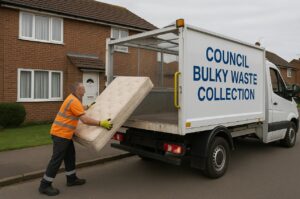
One of the most reliable and accessible options for getting rid of an old mattress in the UK is by using the local council’s bulky waste collection services. Most local authorities provide scheduled pickups for large household items, including mattresses.
To arrange this service, you typically need to visit your local council’s website and fill out a request form. Fees vary depending on the region and the number of items being collected. Councils may also limit the number of collections per household per year.
Advantages include the assurance that your mattress will be disposed of legally and, in some cases, even recycled. However, there are certain limitations. Collection slots may be booked well in advance, and additional charges may apply for each item. Some councils only collect from outside your property, so you may need to move the mattress yourself.
This option is most suitable for those who don’t need immediate disposal or are already arranging the removal of other bulky waste items.
2. Take It to a Mattress Recycling Centre
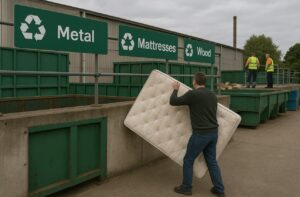
Recycling is one of the most environmentally friendly ways to dispose of a mattress. Many parts of a mattress can be broken down and repurposed, including the metal springs, foam layers, wooden frames, and fabric coverings.
Recycling centres across the UK accept mattresses, though availability can vary by location. You can search for your nearest facility through services such as Recycle Now or your local council’s website. It’s advisable to contact the recycling centre in advance to confirm whether they accept mattresses and if any fees apply.
When preparing your mattress for recycling, ensure it is dry and free from infestations or hazardous materials. Some centres will refuse items that are excessively dirty or damaged beyond handling.
The process involves separating the components for material recovery:
- Steel springs are melted down for reuse in manufacturing
- Foam is cleaned and repurposed for carpet padding or insulation
- Fabric and fibres can be used in the production of industrial textiles
Recycling reduces the burden on landfill sites and extends the life cycle of valuable raw materials.
Table 1: Components of a Mattress and Their Recycling Potential
| Mattress Component | Recyclable Material | Common Reuse Applications |
| Steel Springs | Metal | Scrap metal, new steel products |
| Foam | Polyurethane | Carpet underlay, insulation |
| Fabric | Cotton/Polyester Blend | Industrial rags, cleaning cloths |
| Wooden Frame | Timber | Mulch, composite wood materials |
3. Donate a Mattress in Good Condition
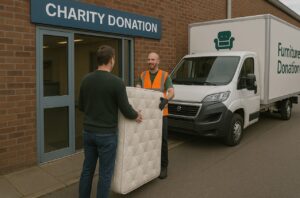
If your mattress is still in a usable condition, donating it to a charity can be a great way to extend its life and help someone in need. Several UK-based charities accept mattresses as long as they meet safety and hygiene standards.
Before donating, make sure the mattress:
- Has an intact fire safety label
- Is clean and free from stains
- Has no broken springs or structural damage
Popular charities that accept mattress donations include the British Heart Foundation, Emmaus, British Red Cross, and Furniture Donation Network. Most of these organisations offer free collection services, though booking in advance is often required.
Mattress donations are often passed on to individuals or families in need, particularly those moving out of homelessness or domestic abuse situations. Some items may also be sold in charity shops to fund community projects.
This option is not only beneficial to others but also contributes to sustainable waste management. Unlike landfill disposal, donations prevent reusable items from going to waste.
4. Hire a Professional Mattress Removal Service
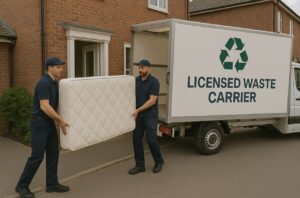
Professional mattress removal services offer convenience, especially for those who may not have transport or time to manage disposal themselves. These services are carried out by licensed waste carriers who collect and responsibly dispose of or recycle your mattress.
Hiring a professional service typically involves booking a collection online or via phone. The company will usually provide a time slot, and the mattress is often collected within one to three working days. Some providers offer same-day or weekend collections for an additional fee.
Benefits include:
- No need to transport the mattress yourself
- Guaranteed legal and ethical disposal
- Fast and reliable scheduling
Prices for mattress collection vary depending on location and service provider. On average, the cost ranges from £30 to £80. It’s essential to ensure the provider is registered with the Environment Agency, as failure to do so could result in fines if the mattress is disposed of illegally.
This option is especially helpful for individuals moving house, managing rental properties, or replacing mattresses in multiple rooms at once.
5. Use Skip Hire for Multiple Bulky Items
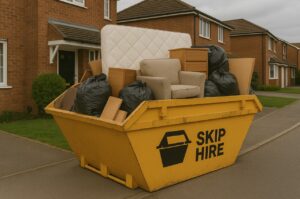
Skip hire is a practical solution for disposing of large volumes of waste, especially during home clear-outs, renovations, or furniture replacements. Mattresses can be included in skips, but it’s important to confirm this with the skip hire company beforehand, as some may charge additional fees.
When hiring a skip, you’ll need to consider:
- Skip size: Smaller skips (4–6 yards) are suitable for limited items, while larger skips (8–12 yards) are ideal for household clearances
- Placement: If the skip will be placed on a public road, a skip permit from the council is required
- Duration: Most skip hire companies offer rental periods from 1 to 2 weeks, with extensions available
Skip hire is most cost-effective when disposing of multiple bulky items at once, rather than a single mattress.
Table 2: Skip Hire Suitability for Mattress Disposal
| Factor | Description |
| Cost | £150 to £250 depending on size and duration |
| Ideal Use | Home renovation, full furniture clear-out |
| Permit Requirement | Needed if placed on public land |
| Mattress Acceptance Policy | Check with provider; additional charges may apply |
| Time Efficiency | Moderate; relies on timely drop-off and collection |
What Are the Eco-Friendly Tips for Mattress Disposal?
Sustainability should be a priority when disposing of household items, including mattresses. While some methods such as landfill disposal are convenient, they contribute heavily to environmental degradation. Here are some alternatives that promote eco-conscious disposal:
- Choose mattresses with longer lifespans to reduce the frequency of disposal
- Buy from retailers that offer mattress take-back or recycling schemes
- Repurpose parts of the mattress creatively, such as using foam for pet beds or wooden frames for DIY shelving
- Avoid burning mattresses, as this releases toxic fumes and is illegal in most residential areas
By considering the environmental impact of your disposal method, you contribute to long-term waste reduction and responsible consumption.
What Are the Common Mistakes to Avoid When Disposing of a Mattress?
When it comes to mattress disposal, many individuals unknowingly make mistakes that can lead to environmental harm, legal consequences, and additional costs. Understanding what not to do is just as important as knowing the correct disposal methods. Below are some of the most common errors people make and how to avoid them.
1. Fly-Tipping (Illegal Dumping)
Fly-tipping refers to the illegal dumping of waste in unauthorised areas such as streets, laybys, alleyways, fields, or even near recycling bins. Unfortunately, mattresses are one of the most frequently fly-tipped items in the UK.
- Why it’s a problem: Fly-tipping not only blights local communities but also leads to significant clean-up costs for local authorities.
- Legal consequences: Individuals caught fly-tipping a mattress can face fines of up to £50,000, prosecution, and even imprisonment.
- How to avoid it: Always use a registered waste carrier or council service, and never leave a mattress outside your home without a booked collection.
2. Burning the Mattress
Some may consider burning an old mattress to quickly get rid of it, particularly in rural areas where space is available. However, this is a dangerous and illegal method of disposal.
- Health hazards: Most modern mattresses contain synthetic materials like memory foam and polyurethane, which release toxic fumes when burned.
- Environmental impact: Burning contributes to air pollution and violates environmental regulations.
- Legal issues: In the UK, unauthorised waste burning is prohibited and can result in fines or enforcement action by local councils and the Environment Agency.
3. Using Unlicensed Waste Removal Services
With the rise in demand for quick waste removal, many people turn to cheap, unverified providers, often found through social media or online classifieds. However, this can backfire if the provider is not registered with the Environment Agency.
- The risk: Unlicensed carriers may fly-tip your mattress elsewhere, leaving you legally liable.
- Your responsibility: Under UK law, householders have a legal duty of care to ensure their waste is disposed of responsibly.
- What to check: Ask for the company’s waste carrier license number and verify it on the Environment Agency’s public register.
4. Dumping at Recycling Centres Without Checking First
Not all recycling centres accept mattresses, and those that do may have specific rules regarding how and when they can be dropped off.
- Potential issues: Turning up unannounced can result in refused entry or being turned away, especially if the site is already at capacity.
- How to avoid: Always check your local Household Waste Recycling Centre (HWRC) website in advance. Some centres require bookings or charge a small fee.
5. Assuming the Mattress Can Be Put in a Wheelie Bin
A common misconception is that cutting up a mattress into smaller pieces makes it suitable for disposal via domestic wheelie bins. This is not allowed by local councils and is considered improper waste handling.
- Why it’s wrong: Mattresses are classed as bulky waste and exceed size and weight limits for standard bins.
- Consequences: This can lead to missed collections, fines, or additional charges from the council.
- Proper action: Use bulky item collection services or arrange professional removal instead.
6. Failing to Check Donation Requirements
While donating is an excellent way to give a mattress a second life, some fail to check the specific requirements before attempting to donate.
- Fire safety regulations: In the UK, all donated mattresses must have the original fire safety label
- Condition standards: Mattresses must be free of stains, tears, and odours. If not, charities will refuse to collect them.
- Solution: Inspect the mattress and check donation criteria with the charity before arranging pick-up.
What Happens to a Mattress After It’s Collected?
Once a mattress is collected, its journey depends on the disposal method chosen. If it’s picked up by a local council or licensed waste carrier, it will typically be taken to a waste transfer station or specialist recycling facility.
At recycling centres, the mattress is manually or mechanically dismantled. The goal is to separate and extract useful materials like metal springs, foam, fabric, and wood. These are then processed and sent to manufacturers for reuse. Foam may be shredded and turned into carpet underlay, while metal components are melted down for steel production.
If the mattress is unsuitable for recycling due to contamination or severe damage, it may be sent to landfill or incineration plants. In either case, reputable services try to minimise waste and prioritise environmental compliance.
Understanding this process ensures that consumers are aware of how their choices impact the waste stream and sustainability efforts.
Why Should You Avoid Throwing a Mattress in a Skip Without Checking?
Many assume that all waste, including mattresses, can be disposed of through skip hire. However, this isn’t always the case. Most skip hire companies have specific policies regarding mattresses due to the difficulty of recycling them and the extra space they consume.
Throwing a mattress into a skip without permission can result in:
- Additional charges applied after collection
- Refusal to collect the skip until the item is removed
- Breach of hire agreement
Because mattresses are bulky and contain mixed materials, they require special handling and disposal procedures. Some companies require you to declare mattress disposal at the time of booking so they can plan accordingly and apply any necessary surcharges.
To avoid penalties or disruptions to your skip hire service, always confirm whether your provider accepts mattresses, under what terms, and what extra costs may be involved.
Final Thoughts on Responsible Mattress Disposal
Disposing of a mattress in the UK involves more than simply taking it to the nearest tip. With growing concerns around environmental impact and strict regulations against fly-tipping, it’s essential to choose a responsible disposal method. From local council collections and recycling centres to professional removal services and charitable donations, there are several legitimate and eco-friendly options available.
For those seeking a convenient and fully compliant service, wasteremovalnearme.co.uk offers a reliable solution for mattress disposal across the UK. The company is fully licensed, adheres to environmental regulations, and prioritises recycling wherever possible. With flexible scheduling, affordable pricing, and a commitment to responsible waste handling, wasteremovalnearme.co.uk stands out as one of the most trusted providers for mattress removal services.
Frequently Asked Questions About Mattress Disposal
Can mattresses be recycled in the UK?
Yes, many recycling centres accept mattresses. The materials like metal springs, foam, and fabric, they are separated and processed for reuse.
Who collects old mattresses in the UK?
Local councils, charities, and private waste removal companies all provide mattress collection services.
Can I donate my used mattress to a charity?
Absolutely. Charities such as the British Heart Foundation and Emmaus UK accept mattresses that are clean and have a fire label.
Is it illegal to dump a mattress in the street in the UK?
Yes, fly-tipping is a criminal offence and can result in fines or legal action. Always dispose of mattresses through legal means.
What is the most eco-friendly way to dispose of a mattress?
Taking it to a recycling centre or donating it is the most environmentally friendly option.
How much does it cost to get rid of a mattress in the UK?
Costs vary from free (donation or some recycling centres) to £80 for private removal services.
Can I cut up a mattress and put it in the bin?
This is not advisable. Most council bins aren’t designed for bulky items, and improper disposal can result in fines.






